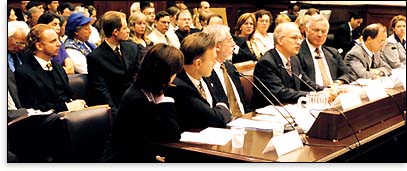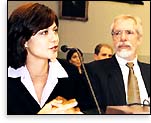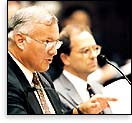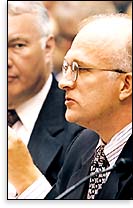
|

Discrimination Focus of Congressional Hearing
International Relations Committee targets violations of human rights standards, state-sponsored religious discrimination in Western Europe.
by Emily G. Stewart

hen religion issues appear on the agenda for U.S. foreign relations, one expects such topics as China and their treatment of the Falun Gong movement.

However, it was democratic nations of Western Europe — specifically Germany, France, Belgium and Austria — that were the focus of a recent U.S. House International Relations Committee hearing on repression of religious freedoms.
Each of the named countries subscribes to principles of religious freedom in their constitution and as a signatory on human rights agreements such as the European Convention on Human Rights and the Universal Declaration of Human Rights.

“In practice, however, expressing a minority religious belief often leads to discrimination... which seriously burdens one’s exercise of freedom of religion,” said U.S. Representative Ben Gilman, committee chairman who presided over the June 14, 2000 hearing. In fact, he said, “China uses Western Europe to justify its brutal crackdown on the Falun Gong.”
The loss of jobs, educational opportunities, the right to gain custody of one’s own child, or to be a foster parent were cited as examples of discrimination in the four named countries. Congressman Gilman also noted that discrimination in the private sector is not only not discouraged, but is encouraged through such means as government compilation of lists and adverse publications about minority religions.

|
 |
HUMAN RIGHTS TESTIMONY
ROBERT SEIPLE:
U.S. Ambassador at Large for International Religious Freedom testified to U.S. government efforts to resolve
religious discrimination issues with French and German officials. “We have stressed in particular the risks
associated with government deciding what does and does not constitute a religion.”
|
 |
The hearing, attended by 17 committee members, additional Congressmen and 180 others including witnesses and observers, was scheduled to last two hours but was extended to four due to the active interest in the issue.
Discrimination in Business
Discrimination in Germany, which has been the subject of multiple U.S. Department of State reports and has escalated onto the agenda of the U.S. Trade Representative (see also: Democracy in the Balance), was an often repeated topic during the hearing.
“The standard applied to these countries by the United States is a standard that they have accepted.” – Ambassador Robert Seiple
|
Ambassador Robert Seiple, U.S. Ambassador at Large for International Religious Freedom, testified that the U.S. government was particularly concerned about state-sponsored discrimination in Germany, including some state governments’ inflammatory brochures and the use of so-called “sect filters” to screen job and contract applicants for membership in minority religions.
“We have discussed these issues at some length with German officials, both in Germany and the United States. We have stressed in particular the risks associated with government deciding what does and does not constitute a religion,” he said.
Among the witnesses who testified was Craig Jensen, owner of a U.S. software company which produced a component used in Microsoft’s Windows 2000 operating system. Some German officials had threatened to ban the Microsoft product because Jensen is a Scientologist.

|
 |
Members of the House International Relations Committee heard testimony from human rights and religious representatives of attempts to curb the free exercise of religion in Germany, France, Austria and Belgium.
|
 |
Catherine Bell, actress and star of the CBS TV series “JAG,” testified on behalf of herself and fellow Scientologist and actress Anne Archer, who could not attend the hearing, on the impact of religious discrimination in Germany on individuals and families. Following incidents in which boycotts or cancellations of Scientologist artists were threatened or effected in Germany, Archer undertook two fact-finding missions to the country. She has addressed the plenary session of the Organization for Security and Cooperation in Europe and met with members of the European Parliament, the EU Council and the U.S. Congress on the issue of religious discrimination in Germany.
Bell articulated cases involving artists and professionals, some in the hearing room, who were forced to leave Germany as a result of efforts to ruin their careers and destroy their livelihoods.
Views of Congressmen at the hearing towards state-sponsored discrimination in Germany were unequivocal. “We must hold the Germans accountable by the strongest possible means,” stated Rep. Don Manzullo of Illinois.

|
 |
HUMAN RIGHTS TESTIMONY
ACTRESS CATHERINE BELL:
Star of TV series “JAG” articulated the impact of religious discrimination in Germany on Scientologists and their families. Discrimination has affected U.S. citizens, including Craig Jensen (seated next to Bell), owner of an American software company which produced a component used in Microsoft’s Windows 2000 operating system. Some German officials threatened to ban the Microsoft product because Jensen is a Scientologist.
|
 |
“Shockingly Unscientific”
Next to Germany, France received the most attention by witnesses throughout the hearing.
Testimony inevitably led to discussion of the infamous 1996 report of a French National Assembly parliamentary commission on so-called sects which published a blacklist of 173 denominations and groups in the country. Among the religions on the list are a Catholic order, the Baptists, other Christian groups, Eastern groups and predominantly minority religions.
The commission report is “shockingly unscientific,” testified Dr. Jeremy Gunn, scholar and broadly published author with the U.S. Peace Institute, who illustrated a comparison of discrimination in France with the era of the Vichy government.
The rapporteur for the 1996 report was convicted in March 2000 for criminal defamation against a spiritual group and his evidence was “denounced for research methods counted by the court as ‘not serious,’” added Rev. Skip L’Heureux, Executive Director of the Queens Federation of Churches, in his testimony before the committee. “Yet the blacklist continues to circulate and is used to justify discrimination.”
The censured report was also used as the reason to establish the government’s “Inter-Ministerial Mission to Fight Against Sects (MILS),” which is spearheading discriminatory bias against minority religions in France.

|
 |
HUMAN RIGHTS TESTIMONY
REV. SKIP L’HEUREUX:
Executive Director of the Queens Federation of Churches testified on a law proposal in France directed against 173 religions including Baptists, a Catholic order, Eastern and minority religions. “Should this law pass, it will place in question France’s commitment to the Helsinki Accords. Such a law would be a cancer on French democracy.”
|
 |
“A Cancer on French Democracy”
Human rights authorities in Europe and the U.S. concur that the MILS and its leader, former politician Alain Vivien, have greatly increased religious intolerance and severely worsened France’s standing in the international human rights community.
Two recent law proposals in the country have done nothing to help France’s reputation. The first, a failed Senate bill introduced in December 1999, was an extension of a 1936 law effected during the Vichy government for the dissolution of groups. Efforts were redoubled with a 2000 National Assembly proposal to grant the government despot-like powers to dissolve religious groups.
“Should this law pass, it will place in question France’s commitment to the Helsinki Accords,” L’Heureux testified to the committee. “Such a law would be a cancer on French democracy.”
One of the primary criticisms aimed at France is the refusal of those leading the confrontational anti-sect stance to engage in dialogue.
The MILS also “frequently employs anti-American rhetoric in order to justify its position, thinking that that plays well in France,” said Dr. Gunn.
Ambassador Seiple said that the U.S. government “engaged actively in promoting a dialogue with French authorities. President Clinton, Secretary of State Albright, the assistant secretary of state, and myself have each raised these issues of religious discrimination with French officials during the past year.”

|
 |
HUMAN RIGHTS TESTIMONY
PHILIP BRUMLEY:
General counsel of Jehovah’s Witnesses testified to mistreatment of members. “We call upon governments to recognize our God-given right to religious freedom that currently Western Europe only extends to majority faiths.”
|
 |
Link to Political Extremism
Testimony about Belgium centered on discrimination that has escalated since a 1997 parliamentary report blacklisted 189 religious denominations and groups, mirroring the French parliamentary report and blacklist. U.S. Representative Matt Salmon told the committee that according to the 2000 report of the International Helsinki Federation, religious minorities in Belgium have been “subjected to various forms of harassment and other human rights violations such as slander, anonymous threats, loss of jobs, bomb threats, and denial of room rental for religious ceremonies.”
With respect to Austria, as well as the other countries discussed in the hearing, concerns are increasing over the link between increased political extremism and religious intolerance.
“I think in Austria there is certainly a link,” said Dr. Robert Hunt, Pastor of the English-speaking United Methodist Church of Austria, who testified before the committee from Vienna by means of digital video equipment. He referred to the recent political campaign, and “a climate that tries to characterize a kind of Germanic-Catholic personality as being truly Austrian — all others being not really quite Austrian.” Pastor Hunt said he believed that “political extremism and nationalism is certainly related” to the rise of discrimination against minority religions.
Philip Brumley, general counsel for the Jehovah’s Witnesses, testified how the Jehovah’s Witnesses in Austria moved through the political and legal court systems for a decade towards obtaining the same religious status as other religions. Just as they were getting to the point of obtaining this religious status, the National Legislature of Austria convened and passed a law which imposes a 10-year waiting period for any organization seeking full religious recognition. “It was clearly passed with us in view,” said Brumley.
Upholding accepted standards
A consensus among all who participated in the hearing was the necessity for dialogue to resolve real or perceived problems with minority religions.
Equally important is the necessity of adhering to the standards set forth in human rights conventions to which each of the countries discussed in the hearing are signatories.
“I want to emphasize that the standard applied to these countries by the United States is a standard that they have accepted,” stated Ambassador Seiple. “All of them embrace the international instruments that protect freedom of religion and conscience, including the Universal Declaration of Human Rights, the European Convention on Human Rights, and the International Covenant on Civil and Political Rights.”
|

|










